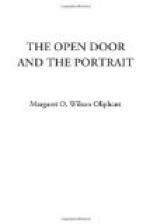It seemed to me that it must be the middle of the night, as we all walked back. It was in reality very late. Dr. Moncrieff put his arm into mine. He walked slowly, with an air of exhaustion. It was as if we were coming from a death-bed. Something hushed and solemnized the very air. There was that sense of relief in it which there always is at the end of a death-struggle. And nature, persistent, never daunted, came back in all of us, as we returned into the ways of life. We said nothing to each other, indeed, for a time; but when we got clear of the trees and reached the opening near the house, where we could see the sky, Dr. Moncrieff himself was the first to speak. “I must be going,” he said; “it’s very late, I’m afraid. I will go down the glen, as I came.”
“But not alone. I am going with you, Doctor.”
“Well, I will not oppose it. I am an old man, and agitation wearies more than work. Yes; I’ll be thankful of your arm. To-night, Colonel, you’ve done me more good turns than one.”
I pressed his hand on my arm, not feeling able to speak. But Simson, who turned with us, and who had gone along all this time with his taper flaring, in entire unconsciousness, came to himself, apparently at the sound of our voices, and put out that wild little torch with a quick movement, as if of shame. “Let me carry your lantern,” he said; “it is heavy.” He recovered with a spring; and in a moment, from the awe-stricken spectator he had been, became himself, sceptical and cynical. “I should like to ask you a question,” he said. “Do you believe in Purgatory, Doctor? It’s not in the tenets of the Church, so far as I know.”
“Sir,” said Dr. Moncrieff, “an old man like me is sometimes not very sure what he believes. There is just one thing I am certain of—and that is the loving-kindness of God.”
“But I thought that was in this life. I am no theologian—”
“Sir,” said the old man again, with a tremor in him which I could feel going over all his frame, “if I saw a friend of mine within the gates of hell, I would not despair but his Father would take him by the hand still, if he cried like you.”
“I allow it is very strange, very strange. I cannot see through it. That there must be human agency, I feel sure. Doctor, what made you decide upon the person and the name?”
The minister put out his hand with the impatience which a man might show if he were asked how he recognized his brother. “Tuts!” he said, in familiar speech; then more solemnly, “How should I not recognize a person that I know better—far better—than I know you?”
“Then you saw the man?”




